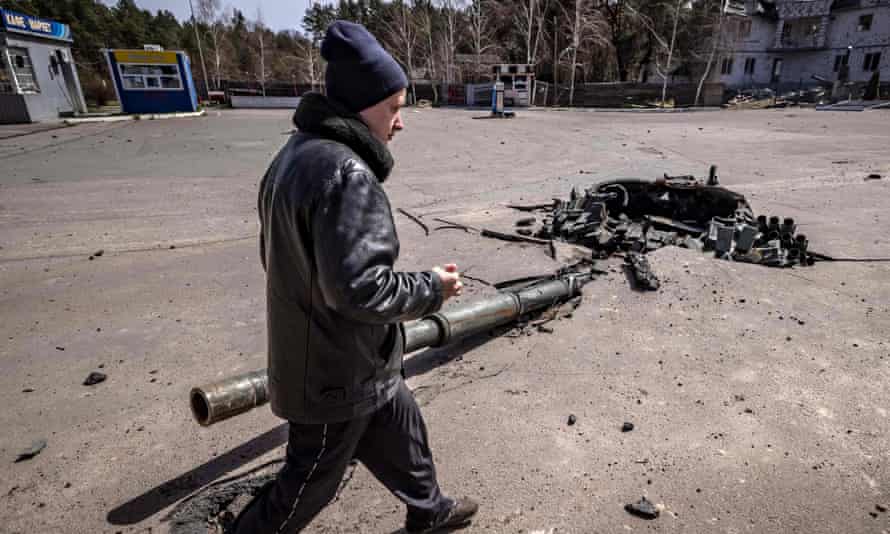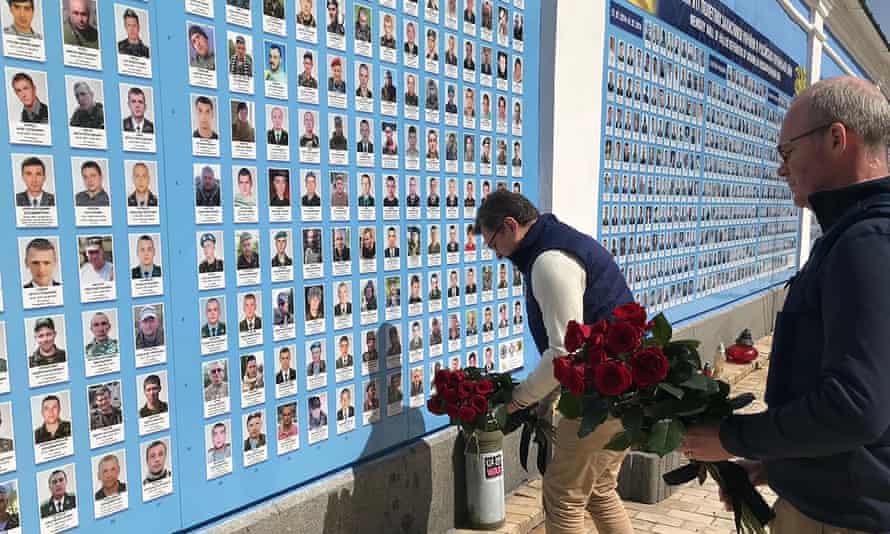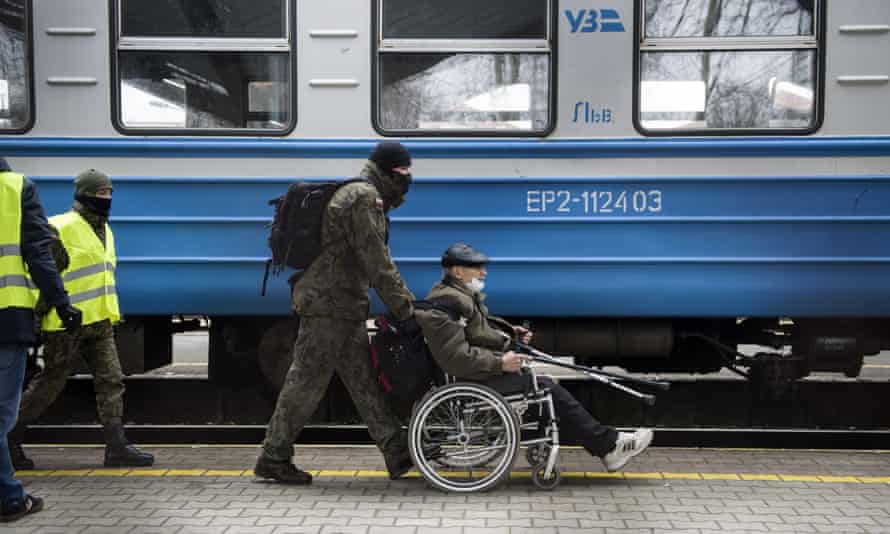Damaged Russian warship Moskva has sunk – Russian ministry
Russia’s defence ministry has put out a statement to say its Moskva missile cruiser has sunk in the Black Sea off southern Ukraine. It is still unclear whether the ship was hit by Ukrainian weaponry.
The ship is believed to have experienced significant damage and was thought to be heading to Sevastopol, Crimea, before it succumbed.
Russia earlier claimed it had experienced damage as a result of an ammunition fire on board. The crew were evacuated. Ukraine claimed the ship has sunk, Russia denied it, then came reports that Russia was towing its ships further out to sea, perhaps to take them out of Ukrainian missile range.
The Moskva was apparently under tow when it sank.
Russia only has three of this flagship class of warship, which have crews of almost 500 sailors.
Catch up
- The Russian flagship cruiser Moskva has sunk in the Black Sea off southern Ukraine, according to Russia’s defence ministry. It is still unclear whether the ship was hit by Ukrainian weaponry. Ukraine claims it was – whereas Russia maintains a fire on board and then “stormy sea conditions” while it was being towed were to blame. Russia only has three of this flagship class of warship, which have crews of almost 500 sailors – and the loss of Moskva is a big blow.
- The lives of some 2.7m people with disabilities are at risk in Ukraine, a UN committee has warned, citing reports that many are trapped or abandoned in their homes, care centres and orphanages without basic supplies or medicines. The Committee said it was “deeply disturbed” that the fate of people with disabilities in Ukraine is “largely unknown”.
- Russia’s deputy foreign minister, Alexander Grushko, said Moscow will take “security and defence measures that we will deem necessary” if Sweden and Finland join Nato. In an interview with the Russian state-owned news agency Tass, the minister said the membership in the military alliance would “seriously worsen the military situation” and lead to “the most undesirable consequences”.
- Russia’s investigative committee said Ukrainian forces carried out at least six helicopter airstrikes on the village of Klimovo in the Russian region of Bryansk, injuring seven people. The Bryansk region governor said earlier that two residential buildings in the village had been hit by shelling, which is north of the Ukrainian region of Chernihiv. Additionally, a village in Russia’s Belgorod region had come under fire from Ukraine, the region’s governor said.
- Ukraine’s foreign ministry has appealed to the United Nations to facilitate the return of Ukrainian children who have been “illegally deported” to Russia. In a statement, the ministry said Russia had “engaged in state-organised kidnapping of children and destruction of the future of the Ukrainian nation”.
- France is planning to return its embassy to the Ukrainian capital Kyiv. It had moved to the western city of Lviv in March as Russia invaded. Ukrainian president Volodymyr Zelenskiy has urged allies to resume normal diplomatic presence in Ukraine. US president Joe Biden also signalled on Thursday that his administration is in the process of deciding whether to send a high-ranking US official to Ukraine.
- Zelenskiy has issued a video compiled by his government that further urges European countries to give up Russian oil that provides “blood” money to Moscow, and appeals for more weapons to help Ukraine repel Russia’s invasion. It begins with ominous music and text on screen saying: “Fifty days of evil in Europe.” Then, over images of consumers filling up their gas tanks, and of oil wells, captions read: “We ask you to stop feeding evil”.
- Moody’s Investors Service has said that Russia “may be considered in default” if it fails to pay bonds in US dollars by 4 May. Russia paid two bonds in rubles this month after sanctions cut the country off from global financial systems and the US banned Moscow from making debt payments using dollars held in American banks.But the payment sin rubles “represents a change in payment terms” and may be considered a default, according to Moody’s. S&P Global Ratings has also declared Russia in default due to its inability to pay bonds in US dollars.
– Léonie Chao-Fong, Joanna Walters, Maanvi Singh
Guardian staff and agencies report:
A criminal case has been opened against a Siberian journalist whose news website published content critical of Russia’s invasion of Ukraine, Russian media reported on Thursday.
Mikhail Afanasyev, chief editor of Novy Fokus in the Russian region of Khakassia, was arrested by security forces on Wednesday over the website’s reporting on 11 riot police who allegedly refused deployment to Ukraine.
Afanasyev was accused Thursday of disseminating “deliberately false information” about the Russian armed forces, an offence which carries a maximum 10-year jail sentence under a law passed last month.
The charges come amid an unprecedented crackdown on independent media and anti-war dissent. Last month, the Russian parliament passed a law imposing a jail term of up to 15 years for spreading intentionally “fake” news about the military.
Afanasyev has published numerous investigations into sensitive issues in Khakassia, such as organised crime and alleged abuses of power by local officials.
In 2009, he was accused of libel after publishing stories that criticised the Russian government’s response to an explosion at the country’s largest hydroelectric plant that year. And in 2016, he reportedly faced death threats from a criminal gang active in the Krasnoyarsk region of Siberia, after he detailed the group’s illegal activities and suspected ties to local police.
Another Siberia-based journalist was also arrested Wednesday on suspicion of breaching Russia’s new laws on media coverage of the situation in Ukraine. Sergei Mikhailov, founder of the LIStok weekly newspaper based in the Republic of Altay, was reportedly placed in pre-trial detention over the outlet’s alleged “calls for sanctions against Russia.”
Read more:
’Collect my parents or collect my son’s body’: a Kyiv family’s tragic plight
Isobel Koshiw
The day Russian troops invaded Ukraine, 18-year-old Oleksandr Ivanov was shot in the forehead and 10 times in the chest while in the passenger seat of his grandmother’s car. They had been driving to Hostomel, outside Kyiv, to pick up his grandfather and bring him to the capital.
Oleksandr, known as Sasha, did not have the life of an ordinary 18-year-old. His mother, Sveta, was diagnosed with muscular dystrophy when Sasha was three. Sasha had spent his life taking care of her, helping her dress, wash and go to the toilet.
Sasha had a natural love of learning, according to his family. From when he started to talk, he loved reciting poetry. At the age of seven he asked if he could learn to play the piano. Despite finishing music school with honours, he decided to study medicine. He attained full marks in Ukraine’s national high school exams for chemistry and biology and was given a scholarship to Ukraine’s best medical school, in Kyiv. Another top university, Taras Shevchenko University, also in Kyiv, rang his mother to complain when they heard he would not be coming to them.
Read more:
US National Security Adviser Jake Sullivan said that the way the Moskva saga “has unfolded is a big blow to Russia”.
US officials have said it is still unclear what caused a blast onboard. But Sullivan said it has forced Moscow to choose between two stories. “One story is that it was just incompetence, and the other is that they came under attack. And neither is a particularly good outcome for them,” Sullivan said at the Economic Club of Washington, DC.
“Only the loss of a ballistic missile submarine or the Kutznetsov [Russia’s lone aircraft carrier] would inflict a more serious blow to Russian morale and the navy’s reputation with the Russian public,” said Carl Schuster, the former director of operations at the US Pacific Command’s Joint Intelligence Center.
Russia’s Moskva missile cruiser sank in a “stormy sea” while being towed, the Russian defence ministry said in a statement.
“The cruiser ship Moskva lost its stability when it was towed to the port because of the damage to the ship’s hull that it received during the fire from the detonation of ammunition. In stormy sea conditions, the ship sank”
Russia and Ukraine have conflicting accounts of what happened to the cruiser, with Ukraine claiming it began to sink after it was hit by Ukrainian Neptune anti-ship missiles, and Russia saying a fire on board caused munitions to explode.
Moody’s Investors Service has said that Russia “may be considered in default” if it fails to pay bonds in US dollars by 4 May.
Russia paid two bonds in rubles this month after sanctions cut the country off from global financial systems and the US banned Moscow from making debt payments using dollars held in American banks.
But the payment sin rubles “represents a change in payment terms” and may be considered a default, according to Moody’s. S&P Global Ratings has also declared Russia in default due to its inability to pay bonds in US dollars.
Russia is now moving closer and closer to its first failure to repay debts since the 1917 Bolshevik Revolution.
Damaged Russian warship Moskva has sunk – Russian ministry
Russia’s defence ministry has put out a statement to say its Moskva missile cruiser has sunk in the Black Sea off southern Ukraine. It is still unclear whether the ship was hit by Ukrainian weaponry.
The ship is believed to have experienced significant damage and was thought to be heading to Sevastopol, Crimea, before it succumbed.
Russia earlier claimed it had experienced damage as a result of an ammunition fire on board. The crew were evacuated. Ukraine claimed the ship has sunk, Russia denied it, then came reports that Russia was towing its ships further out to sea, perhaps to take them out of Ukrainian missile range.
The Moskva was apparently under tow when it sank.
Russia only has three of this flagship class of warship, which have crews of almost 500 sailors.
Volodymyr Zelenskiy has issued another video compiled by his government that further urges European countries to give up Russian oil that provides “blood” money to Moscow, and appeals for more weapons to help Ukraine repel Russia’s invasion.
The Ukrainian president tweeted out a video, in similar fashion to ones issued before, and an example of which was particularly arresting when he played it in the middle of his video address to the US Congress last month.

The video shows very graphic images of the effects of the violence perpetrated on Ukrainians by Russian forces and weapons and we won’t embed it here, intentionally, as it quickly becomes upsetting with little warning. Here is a link to the tweet.
Zelenskiy tweeted the following text to go with the video:
They’ve been trying to destroy us for 50 days, but the people are heroically resisting. We fear nothing, we know what we’re fighting for. We are brave enough to put an end to evil. Stop feeding the military machine. Help with weapons. Then peace & good will win faster.
It begins with ominous music and text on screen saying: “Fifty days of evil in Europe. Is there anything else that Russia hasn’t done yet in Ukraine?”
The video is only just over a minute and a half long but uses images of wounded and dead children, blood-soaked toys and streets, huge structural damage and the wailing of Ukraine’s bereaved. Beneath such images, the captions read, in answer to the rhetorical question posed above: “Murdering children, destroying entire cities, mining playgrounds, missile strikes on refugees, mass murder, stealing…[Russia] telling bald-faced lies to the whole world.”
Then, showing images of consumers filling up their cars with gasoline, and oil wells, the captions said: “We don’t ask you to resist evil instead of us, we ask you to stop feeding evil, and provide us with weapons,” with images of weapons such as fighter jets that the west has declined to supply to Zelenskiy, judging it too provocative to Russian president Vladimir Putin and risking NATO and Russia going to war.
Then, against a backdrop of the blue and yellow Ukrainian flag, the caption says that Ukrainians have enough bravery to defeat evil and images show patriotic countrymen, both military and civilian, fighting back against the invasion.
France to move its Ukrainian embassy back to Kyiv
France said on Thursday its embassy in Ukraine would return to the capital Kyiv from the western city of Lviv, where it had been relocated in early March after the Russian invasion, Agence France-Presse reports.

French foreign minister Jean-Yves Le Drian made the announcement during a telephone conversation with his Ukrainian counterpart, Dmytro Kuleba.
This redeployment will happen very soon and will allow France to deepen its backing for Ukraine even further in all spheres to face the war unleashed by Russia on February 24,” the foreign ministry said in a statement.
France, however, continues to advise its nationals against returning to Ukraine, including to Kyiv.
We consider returning remains unthinkable for those French people who lived in Ukraine. The return of French compatriots today remains formally prohibited,” the French government noted on Tuesday, stressing that “the whole of Ukraine remains a war zone”.
France is providing support to Ukraine through military equipment, humanitarian aid and assistance for investigations into abuses allegedly committed by Russian forces against Ukrainian civilians, in addition to humanitarian supports for Poland and Moldova, which are hosting many Ukrainian refugees.
In recent days a number of other nations have said they will reopen their embassies in Kyiv, following the withdrawal of Russian forces that had been advancing on the sprawling capital before their efforts were thwarted, including the Czech, Italian, Portuguese and Turkish embassies and the European Union office.
Joe Biden signalled on Thursday that his administration is in the process of deciding whether to send a high-ranking US official to Ukraine.
The US president noted that he would be ready to go himself, but talk in Washington circles is that any such move would be more likely to involve US secretary of state Antony Blinken or defence secretary Lloyd Austin.
Biden spoke to gathered reporters as he was boarding Air Force One on the outskirts of the capital, on his way to North Carolina on a trip related to his domestic agenda.
Before boarding AF1, Biden appears to tells reporters that he’s ready to travel to Ukraine, which has been fighting off an invasion by Russia since late February. The administration reportedly wants to send a high-ranking official to reaffirm support. https://t.co/gNrYU7lYZg
— Avi Bajpai (@avibajpai_) April 14, 2022
When Biden was in Poland last month, he gave all the signs that he wanted to visit Ukraine and hinted he might go, but it did not happen and it appeared that it was too dangerous at that time.
That was before Russian forces withdrew from their advance on the Ukrainian capital Kyiv.
Since the withdrawal, a number of European leaders have visiting Ukrainian president Volodymyr Zelenskiy in Kyiv including, last weekend, British prime minister Boris Johnson, with images whirling around the world of him walking the streets with Zelenskiy after a meeting and press conference.
Blinken briefly crossed onto Ukrainian soil in early March, while visiting the Polish border, but it was essentially an entirely symbolic gesture of solidarity.
Summary
It’s 9pm in Kyiv. Here’s where we stand:
- The lives of some 2.7m people with disabilities are at risk in Ukraine, a UN committee has warned, citing reports that many are trapped or abandoned in their homes, care centres and orphanages without basic supplies or medicines. The Committee said it was “deeply disturbed” that the fate of people with disabilities in Ukraine is “largely unknown”.
- Russia’s deputy foreign minister, Alexander Grushko, said Moscow will take “security and defence measures that we will deem necessary” if Sweden and Finland join Nato. In an interview with the Russian state-owned news agency Tass, the minister said the membership in the military alliance would “seriously worsen the military situation” and lead to “the most undesirable consequences”.
- Russia’s investigative committee said Ukrainian forces carried out at least six helicopter airstrikes on the village of Klimovo in the Russian region of Bryansk, injuring seven people. The Bryansk region governor said earlier that two residential buildings in the village had been hit by shelling, which is north of the Ukrainian region of Chernihiv. Additionally, a village in Russia’s Belgorod region had come under fire from Ukraine, the region’s governor said.
- Ukraine’s foreign ministry has appealed to the United Nations to facilitate the return of Ukrainian children who have been “illegally deported” to Russia. In a statement, the ministry said Russia had “engaged in state-organised kidnapping of children and destruction of the future of the Ukrainian nation”.
That’s it from me, Léonie Chao-Fong, today. I’m handing the blog to my US colleague, Joanna Walters. Thank you for reading.
Fate of millions of people with disabilities in Ukraine ‘unknown’, UN says
The lives of around 2.7 million people with disabilities are at risk in Ukraine, a UN committee has warned, Reuters reports.
Citing reports that many are trapped or abandoned in their homes, care centres and orphanages without basic supplies or medicines, the Committee of the Rights of Persons with Disabilities published a statement that read:
The committee is deeply disturbed that the fate of people with disabilities in Ukraine is largely unknown.
People with disabilities have limited or no access to emergency information, shelters and safe havens, and many have been separated from their support networks, leaving them unable to respond to the situation and navigate their surroundings.

It noted that few people with disabilities were among those internally displaced or who had reached Ukraine’s borders as refugees, “indicating that many of them have not been able to flee to safety”.




